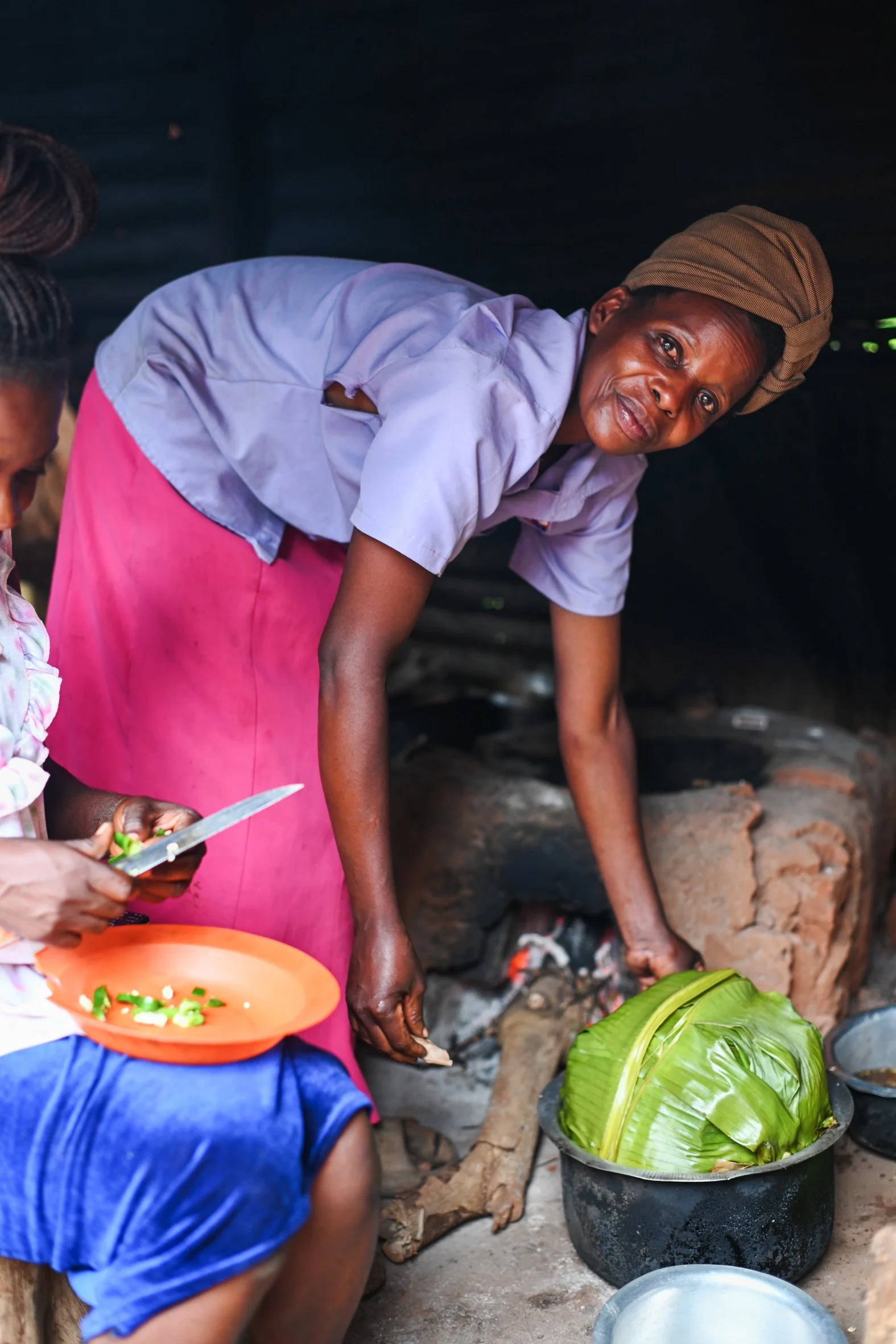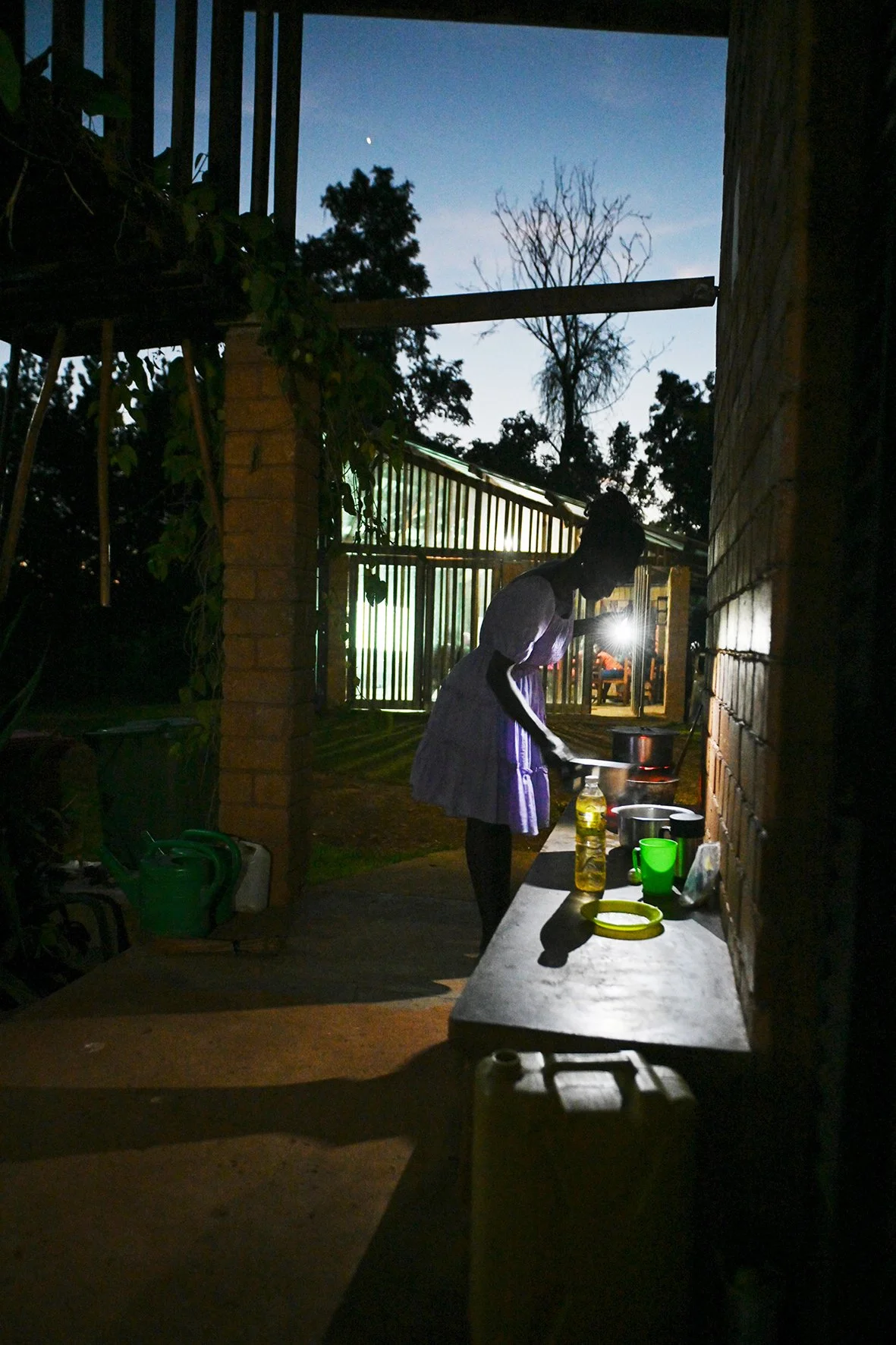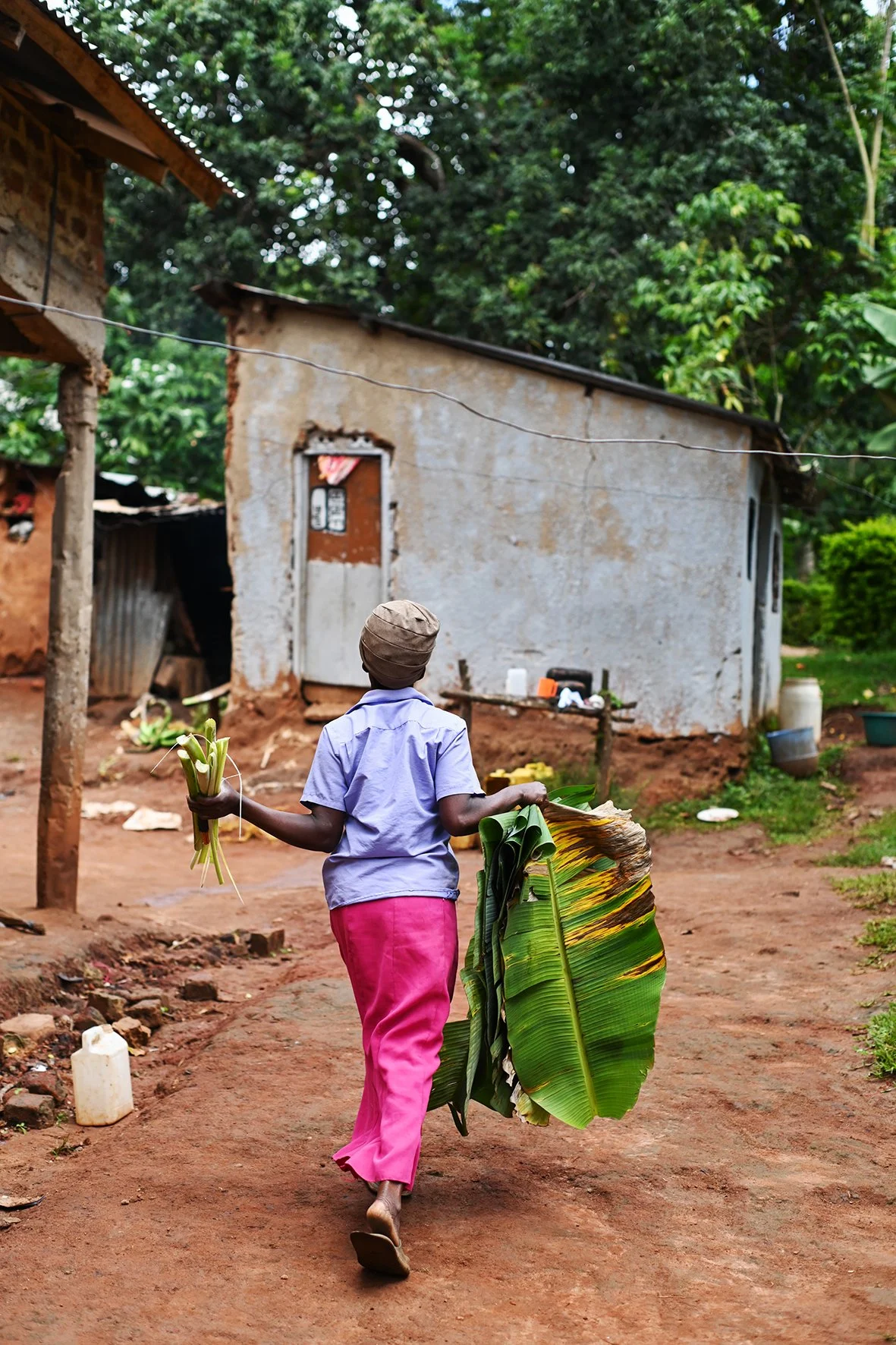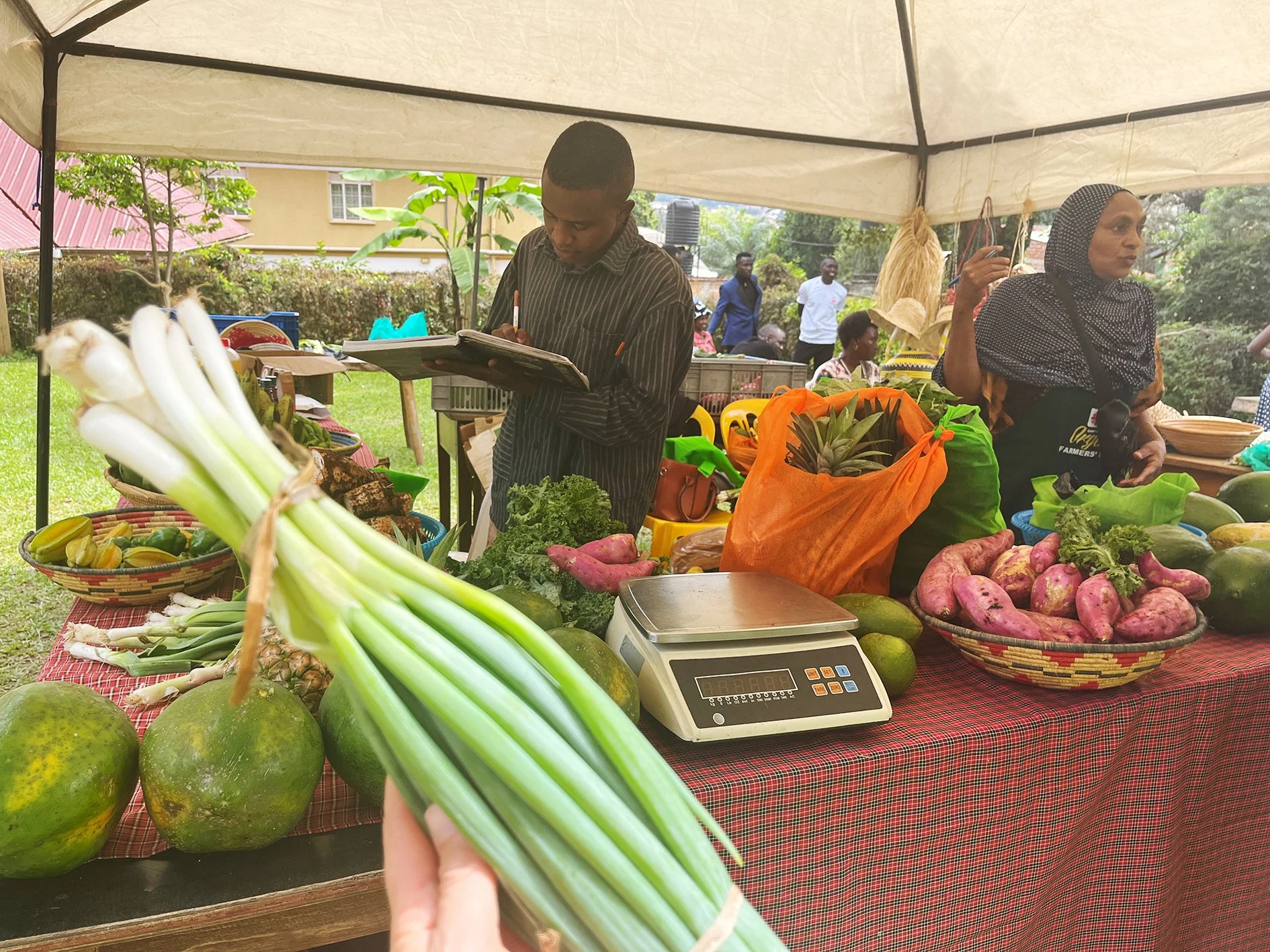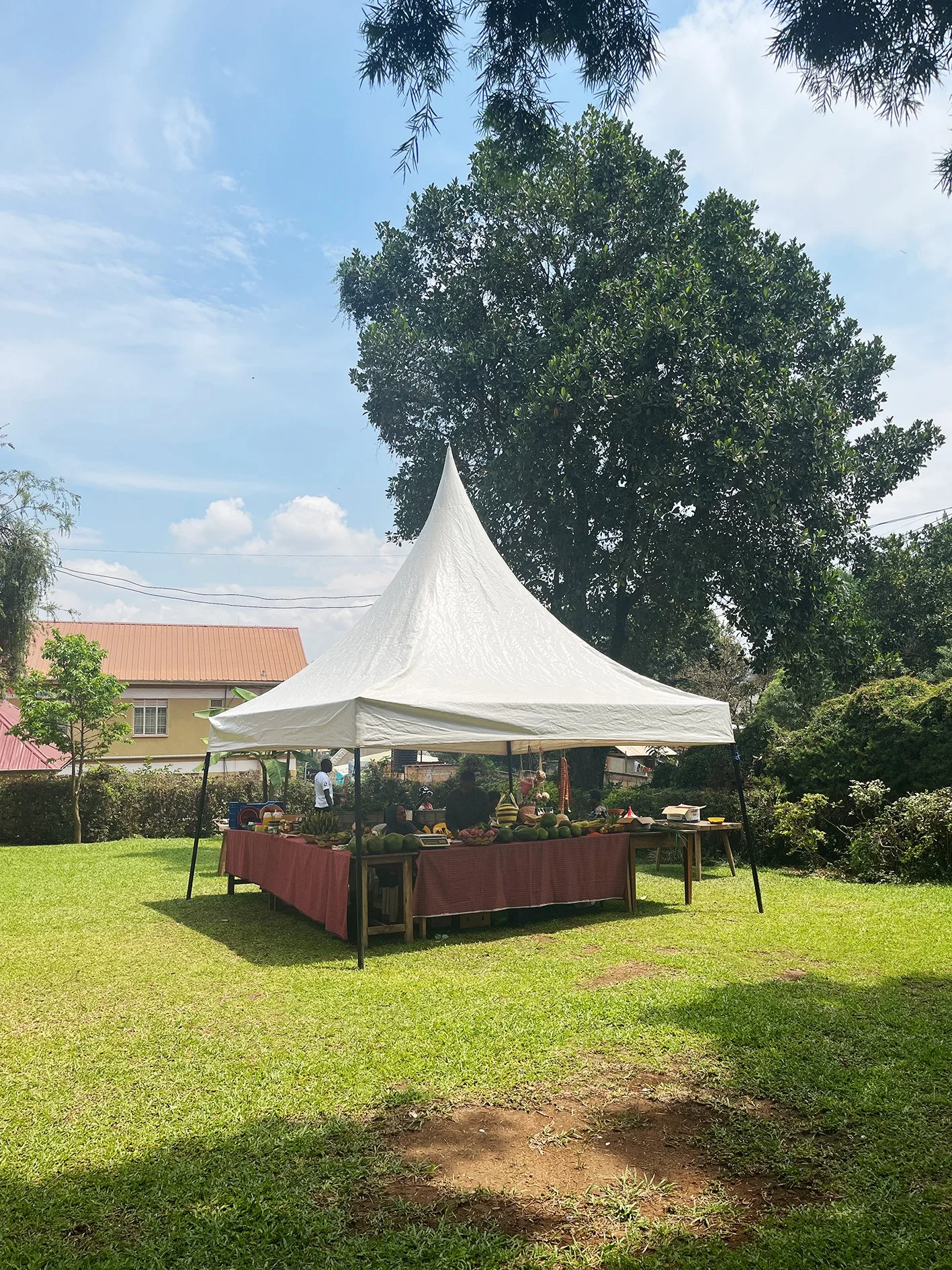“WE DON’T WRITE DOWN RECIPES, WE KEEP THEM IN OUR HEAD.”
Preparing indigenous dishes and wild mushrooms in Mityana, Uganda.
People often ask me, "What exactly do you want to do?" My vision: a social enterprise built around nutritious heritage foods in Africa, focusing on every part of the production chain, from soil to plate. The bigger question is: What will people want to eat? How do we bring nutritious, delicious, and indigenous foods to market in an exciting way? If it were easy, we’d already see these options on supermarket shelves and local markets.
This week returning to my soon-to-be home at RUCID College, where I’ll be building BODY&SOIL’s headquarters, I was greeted with the typical lunch: posho (stiff maize meal porridge) with beans and avocado. Without the avocado, it’s the standard institutional meal but it doesn’t reflect Uganda's rich food heritage. For breakfast, there was maize meal porridge and toast. I realized that to understand what we’re up against, I need to comprehend why this limited diet persists among staff and students here.
In the evening, I cooked with some of the students and learned their food stories. “Do you learn recipes from your parents or elders?” I asked. “We don’t write them down; they’re kept in our heads.” Their home regions each have unique food traditions—like fermented cassava porridge in the north, matooke (plantain) in the central region—yet school meals often center on maize, even when students don’t love it.
Landscape surrounding RUCID organic College in Mityana
Cooking with the students at RUCID College in Mityana.
I speak to everyone I meet about what I’m doing—even my driver, Stephan. He shared his worries, “Doctors tell people to eat differently, but not what to eat!” he said.
“I wonder where our generation is going to end up because if you don't have money for medication or can’t eat healthily, then you die.” At breakfast, I discussed with Francis, RUCID’s general secretary, why Ugandan food culture centers on sameness: everyone sells the same foods, street vendors offer identical products, and schools serve limited menus. “It’s the mindset we’re raised with,” he said. “If you try to do something different, people see you as an outcast.” This conformity extends beyond food; it’s rooted in culture and the economy.
Shifting mindsets about food will be one of our biggest challenges. Yet there are moments that remind me of what’s possible. I cooked with Nambatya Robina, a farmer next to RUCID, who raises eight children on just under an acre of land. She wanted to buy something “special” for me, but we insisted she make her usual meal. She and her husband can’t afford the school’s €5 per child meal fee for a trimester. So, she cooks from her garden and brings it for their lunches, with leftovers for dinner.
Today they’ll be eating matoke, along with a local variety of dried mushrooms and avocado. What if schools could buy directly from farmers instead of relying on sacks of maize and supplement with their own vegetable gardens? It’s an idea we’ll definitely explore!
Preparing local food with a mother and farmer in Mityana.
The wild mushrooms she gathers from her garden are a “last resort” when there’s no money for beans or fish. She doesn’t even know their name, almost as if they’re not recognized as “real” food, despite being nutrient-rich. But if people saw these traditional foods as valuable, they could transform diets for the better.
Btw, lunch was delicious!
I asked her how her childhood food compares to what she eats now. “The fruits used to be tastier,” she said. Neighbors spray with chemicals, and even her small field, where she avoids any chemicals, is affected by the drift.
Matooke with wild mushrooms
Eating the delicious lunch!
Yesterday, I visited an organic farmers' market here in Kampala, organized by Caritas with NOGUM (National Organic Agricultural Movement of Uganda), a group RUCID is part of. Well it was more like one stall than a market. I saw beautiful, locally grown produce, but many indigenous foods were missing, and some products could be packaged more appealingly. Imagine expanding this kind of market! The potential is here, but awareness is still growing; many don’t realize that organic means grown without chemicals and that it’s healthier.
So, what are our next steps toward the bigger vision? Next week, I’ll start documenting everything growing in RUCID’s demo gardens, labeling plants in local languages and English together with the team and students. We’ll assess how to make the campus 100% self-sufficient with what’s already growing and identify indigenous foods needing further nutritional research.
Then I'll be busy renovating and setting up the BODY&SOIL base with a classroom and rooms for myself, team members, and supporters.
We’ll continue with a baseline study of existing resources and grassroots research, by first identifying two nearby communities with schools that want to shift to healthier foods and learn regenerative farming and safe processing. Within these two communites, RUCID will lead hands-on training for the farmers and schools, while BODY&SOIL will work with the women, students, and children, focusing on bringen food from the fields into the kitchen. Together we’ll experiment with these nutritious foods which could replace maize meal, monocultures, and imports, while teaching practical ways to integrate nutrition into diets and strengthen immune systems.
Organic Market in Kampala
The one stall selling organic produce in Kampala, Uganda.
This first round of research will take two to three years. During this pilot period, we’ll focus on building a scalable structure, the outcome being a community co-created manual—a roadmap to healthy soils, safe processing, healthier diets, less disease, and greater income. The connection from soil to plate will make this manual unique. The goal is to create a concept that’s scalable for framers and schools across the country and Africa to become self-sufficient while identifying heritage crops that can be turned into healthy products with market potential.
Besides nutrition, one of BODY&SOIL's biggest roles will be documenting the story of this journey—not just to market products, but to create awareness and inspire other communities to flourish using these methods.
100% this vision will come with lots of challenges, and we can’t expect to shift mindsets right away. It’s a learning journey, taking things one step at a time. We’ll need to adapt and refine what might not be working. It’s an experiment, but we have to try because this work could save lives, ease the effects of climate change, and build livelihoods. It’s big and scary, but I know it’s worth it.
To be concrete, this is where I need financial support right now:
- Renovating five rooms at RUCID with local materials to create comfortable spaces for myself, my team, and guests, including experts and supporters.
- Renovating a classroom and building an energy-efficient kitchen as a central space for cooking sessions and training.
- Developing a solid website to support our growth, which also requires expertise.
- Acquiring a car for safe and cost-effective research trips, to avoid relying on motorcycle taxis or expensive rentals.
Of course there will be running costs for our two connecting teams to get this off the ground, but these are the first steps.
The soon to be BODY&SOIL classroom.
THANK YOU!
Before I close, I want to say thank you to my friends and supporters in Germany! I’m super greatful to everyone who has shared skills, connections, financial support, their home or simply made me feel less alone. Special thanks to Marion, Niklas, Claudia, Kathi, Nina, Mischa, Petra, Vera, Anette, Lara, Simon, Markus, and many others who have helped in their unique ways.
Thank you also to VUNKY FOODS, who cooked an incredible farm-to-table meal for the BODY&SOIL fundraising dinner in Köln at the bulthaup showroom kitchen.
Every bit of support, whether a message, advice, or contribution, keeps me going.Thank you for joining me on this journey, and feel free to share!
With love from Uganda!
Maria Schiffer at RUCID.
